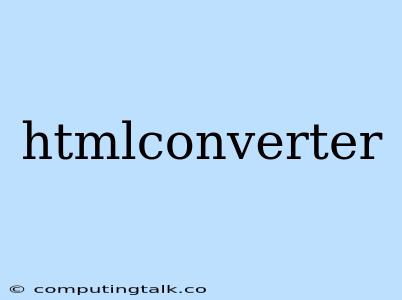HTMLConverter is a powerful tool that simplifies the process of converting HTML content to various formats. It offers a flexible and efficient way to manage your web content and make it accessible in different formats.
What is HTMLConverter?
HTMLConverter is a software or online service designed to convert HTML documents into other formats. These formats can include:
- PDF (Portable Document Format): This is the most popular format for sharing and archiving documents. HTMLConverter can convert your web pages into high-quality PDF files, preserving the original layout and formatting.
- Word (.doc or .docx): You can use HTMLConverter to convert your web pages into editable Microsoft Word documents, allowing you to easily modify and reuse the content.
- Plain Text (.txt): This format strips away all formatting and presents the raw text content of your HTML document.
- Image formats (PNG, JPG, GIF): Some HTMLConverter tools can convert web pages into static images, capturing the entire page layout.
Why Use HTMLConverter?
There are several reasons why you might choose to use an HTMLConverter:
- Sharing and Archiving: Convert web pages into easily sharable formats like PDF or Word documents.
- Offline Access: Store web pages in a format that can be accessed without an internet connection.
- Content Reuse: Extract content from HTML documents and reuse it in other applications.
- Accessibility: Make your web content accessible to people who use screen readers or other assistive technologies.
- Printing: Convert web pages into printable formats for easy distribution.
How to Use HTMLConverter
The process of using an HTMLConverter is generally straightforward:
- Choose a Converter: Select a converter that supports the desired input and output formats.
- Input the HTML: Provide the HTML content you want to convert. This could be a URL, a local HTML file, or directly pasted HTML code.
- Select Output Format: Specify the target format for your conversion (PDF, Word, Text, etc.).
- Customize Settings: Some converters offer additional settings, such as page size, margins, header/footer options, and more.
- Convert: Initiate the conversion process. This might involve uploading the file, clicking a button, or submitting the code.
- Download or View: Download the converted file or view it directly in the browser.
Tips for Using HTMLConverter
- Test with Sample Content: Before converting large or important documents, test the converter with small sample files. This helps ensure that the results are as expected.
- Review the Output: After conversion, carefully review the output file to make sure all the formatting and content have been translated correctly.
- Use a Reliable Converter: Choose a reputable HTMLConverter that is known for its accuracy and reliability.
- Check for Updates: Some converters have regular updates that address bugs and improve performance. Keep your converter up to date for the best experience.
Conclusion
HTMLConverter is a versatile tool that can be helpful in various situations. Whether you need to share web content, create offline versions, or reuse content in different formats, HTMLConverter provides a convenient and efficient solution. By understanding the basics of using an HTMLConverter and following the provided tips, you can easily convert HTML content to other formats and achieve your desired results.
